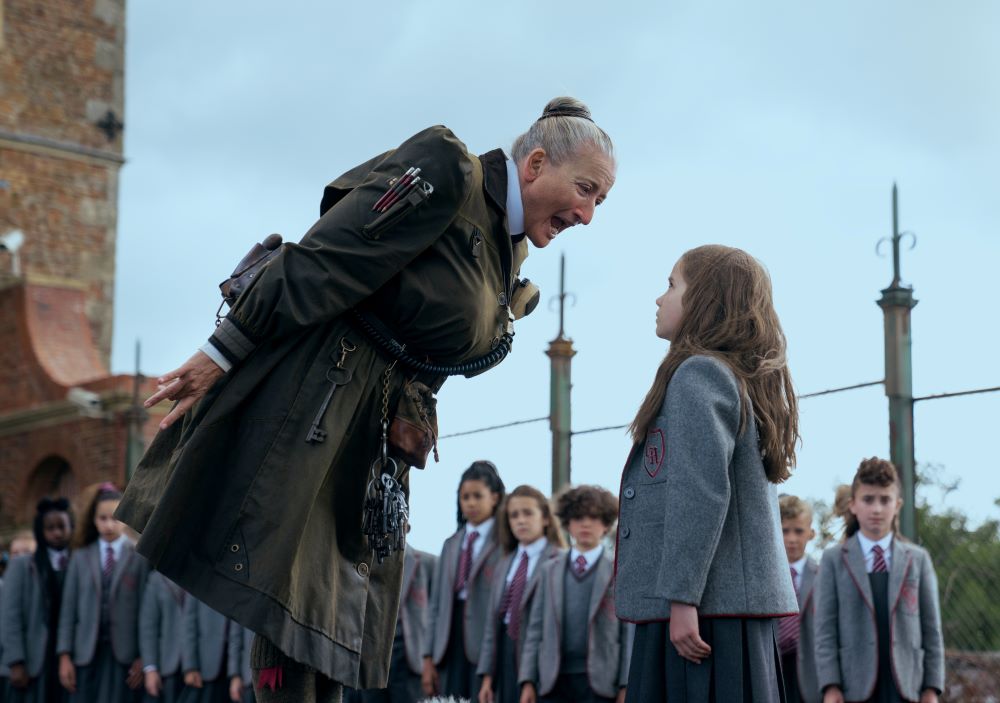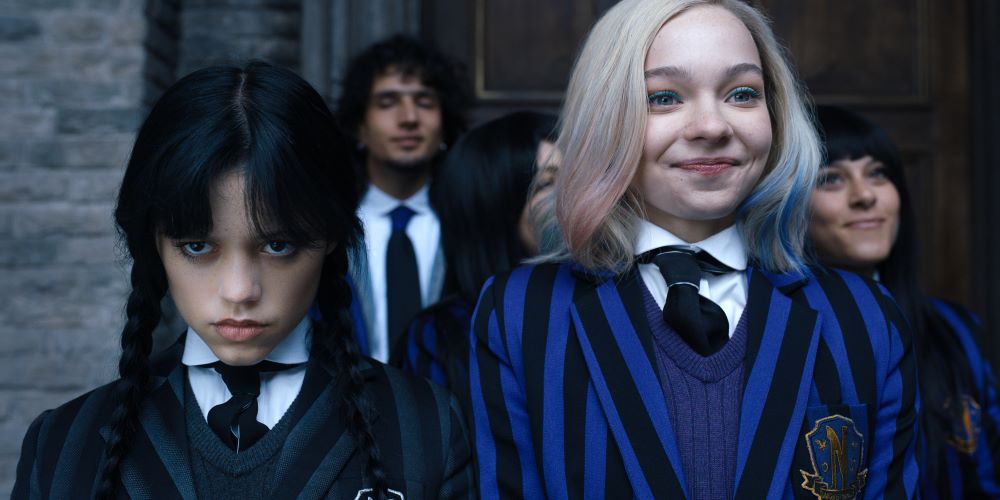
"Roald Dahl's Matilda the Musical" stars Emma Thompson as Agatha Trunchbull, a tyrannical principal, and Alisha Weir as student Matilda Wormwood. (Dan Smith/Netflix © 2022)
Over the last few months, a curious trend has appeared on streaming platforms, particularly Netflix. Between the release of the episodic teen mystery "Wednesday" and the film remake of the Broadway hit "Matilda," it seems that Netflix is betting big bucks on the female antihero and storylines that are more sour than ever before. This trend is confirmed by the ordering of second, third and fourth seasons of some of their other massive successes that feature female antihero leads: "Ginny and Georgia," "Dead to Me" and "You" to name a few.
Netflix is one of the largest entertainment companies in the world, with more than 220 million subscribers, Netflix's massive investments and successes with these shows can serve as up-to-date cultural indicators. Netflix sells these shows to us because they know we'll buy them, eagerly and greedily.
So the question becomes: If the doe-eyed beauty queens of the '50s and '60s (Marilyn Monroe, Audrey Hepburn), were replaced by the effortlessly sexy girls next door of the '90s and early 2000s (Julia Roberts, Cameron Diaz, Andie MacDowell) and those girls were replaced by the big-hearted, wonderfully weird female leads of the 2010s (Amy Poehler, Zooey Deschanel, Mindy Kaling), then do Netflix's new megahits mark the reign of a different, darker female lead? Is this new leading lady a reflection of the average modern woman or is it the other way around? Does entertainment reflect culture or does culture mimic what's being fed to it as entertainment? And whichever it is: Is it a good thing?
"Wednesday," Netflix's "Gilmore Girls" for goth teens, is creepy, wry and at times gory — all words that the titular character would be delighted to read on either her tombstone or in this review. "Matilda" is dark in a way that is perhaps even more haunting, as the young heroine's greatest adversaries aren't monsters and spells but rather negligent and abusive adults and broken systems.
Both young women fight for justice and truth, often employing their supernatural powers to do so. They serve as fine examples of courage for other students around them, leading outright rebellions against the oppressive regimes they find themselves in. Neither is anyone's definition of a stereotypical "happy child," but considering their circumstances, how could they be?

Jenna Ortega plays Wednesday Addams, and Emma Myers plays Enid Sinclair, her roommate, in episode 102 of Netflix's "Wednesday." (Courtesy of Netflix © 2022)
One large difference between the characters is that while Wednesday responds to the world around her with sarcasm, processing her misfortune with snark and a penchant for the morbid, Matilda's response to the sourness of her world never causes her to lose her sweetness, except perhaps for the moments in which she sticks up for others in lieu of sticking up for herself.
It's hard to tell if Wednesday's Machiavellianism, narcissism or psychopathy (referred to in psychological circles as "The Dark Triad'' of antihero traits) is a true reflection of her or just performative teenage nonsense. For what it's worth, I lean toward the latter and I think her writers do, too.
In contrast, Matilda is simply a young hero found in dire straits who resorts to wild and sometimes even violent measures to protect the vulnerable. Perhaps that abandonment of purely altruistic motives pushes Matilda into antihero territory, but she carries it with more grace than Wednesday. Dissenters may argue that this has more to do with the shows' different target audience ages or the fact that a television show allows for more complicated character development than a movie, but I think that the effect (how these shows influence young women) outweighs the intent.
Similarly, I don't want to discourage the creation of complicated female characters. But the line between flooding streaming platforms with antiheroes versus nuanced characters is an important one. Whichever leading lady young girls choose to exemplify will have far-reaching cultural implications.
Advertisement
My concern is that young people who find their own reality reflected in Wednesday's world (parents who don't understand them, annoying classmates, teachers who just don't get it) might start emulating her behavior. While that's entertaining in a cleverly scripted television show, it translates into bitterness offscreen.
Meanwhile, a clearer lesson can be drawn from Matilda and her story, as it focuses on a young woman who faces real injustice (abuse at home and at school) and has to tap into the bravest parts of her heart to stand up for what's right.
I am excited to see more thoughtfully written women — especially young women — in movies, but I worry about the ways their traits will be reflected back to us. Matilda proves that a young female character can be nuanced, even dipping into moments of darkness, without becoming a caricature of teenage angst marketed as aspirational. Further, I'm not against dark female leads, but it seems that Netflix is trending toward presenting almost exclusively antihero female leads, and that concerns me.
Wednesday's snippy one-liners made me laugh and Matilda's bursts of righteous anger made me cheer, but we need to make sure that we hold space for other types of female leads, too. If every nuanced character shares the same "nuance," then there's really no nuance to it at all.







